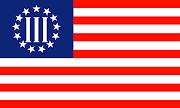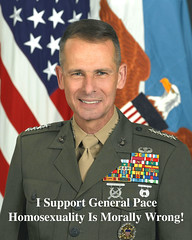What Does the Pope Know About World Affairs?
Taken from The New Oxford Review, November, 2005
In The American Conservative (Aug. 29), Daniel McCarthy has an article titled "Bush vs. Benedict." Says he: "And like John Paul II, the new pope [Benedict XVI] is a man of peace whose vision for the world does not include wars of the sort lately waged against Iraq. The priority Benedict places on peace was apparent even in his choice of name." McCarthy quotes Benedict: "I chose to call myself Benedict XVI ideally as a link to the venerated pontiff Benedict XV, who guided the Church through the turbulent times of the First World War. He was a true and courageous prophet of peace who struggled strenuously and bravely, first to avoid the drama of war and then to limit its terrible consequences. In his footsteps I place my ministry...."
McCarthy continues: "The new pope would be a sure ally for the Right in the Culture War. But where hot wars are concerned, many of Ratzinger's most ardent admirers -- Catholic neoconservatives especially -- find themselves diametrically at odds with the pope."
McCarthy mentions the usual suspects: Michael Novak, George Weigel, Richard John Neuhaus. For them, when it comes to U.S. foreign policy, says McCarthy, "it is Bush sí, Benedict no."
McCarthy quotes then-Cardinal Ratzinger: "The pope [John Paul II] expressed his thought with great clarity [on the invasion of Iraq], not only as his individual thought but as the thought of a man who is knowledgeable in the highest functions of the Catholic Church.... The Holy Father's judgment is also convincing from a rational point of view: There was not sufficient reason to unleash a war in Iraq."
McCarthy says: "There is no mistaking the gravity of their [the two popes] views. If, as both men believed, the attack on Iraq in 2003 was unjust, support for the war becomes unconscionable. Novak, Neuhaus and Weigel have spent much of their careers battling relativism, arguing forcefully that there is moral truth at the core of even the most contentious and divisive issues. There is a moral truth...at the heart of the Iraq War. The war in Iraq is a matter of moral right and wrong. Catholic neoconservatives say it was right; Benedict says it was wrong."
According to McCarthy, conservative Catholics face a problem: "Their president, the Republican Party, and the leading Catholic intellectuals who identify themselves as conservatives all support a policy that the pope opposes. Yet the antiwar movement seems at a glance to consist of people whose values are unalterably opposed to a Catholic's -- a motley collection of secular leftists, many of them supporters of abortion and homosexual marriage."
Thank goodness, McCarthy points out that there is "a conservative alternative...which agrees with the pope on hot wars and the culture wars alike. This brand of antiwar Catholicism is to be found in periodicals like The Wanderer, a 138-year-old newspaper based in Minnesota, and the considerably younger New Oxford Review."
McCarthy is right on the money when he says: "The price paid by antiwar Catholic conservatives...has been ostracism from the respectable Right." Happily, the neocons can't ostracize Pope John Paul and Pope Benedict from the respectable Right. What they do instead is ignore or minimize the two popes' opposition to the Iraq War.
McCarthy reminds us of recent history: "Even the late Brent Bozell, a founding father of postwar conservatism...found himself marginalized after he and the Catholic magazine he founded, Triumph, began to grow critical of the Vietnam War. [You will notice that Bozell still graces our masthead.] The conservative movement that has built itself a big tent in so many other respects still counts dissent in the foreign-policy arena as an excommunicable offense." Of course Bozell was right about the Vietnam War; nonetheless, his excommunication lasts even into death.
In First Things (Dec. 2001), the Editors, the primary one being Fr. Neuhaus, had a raging editorial called "In a Time of War" in response to 9/11. The editorial begins: "This is war." Neuhaus continues, "we are engaged in a war that can be defined in many ways, but is also and inescapably a war of religion." Neuhaus says America "is an overwhelmingly Christian nation rooted, albeit sometimes tenuously, in the Judeo-Christian moral tradition." Neuhaus affirms that America is God's "almost chosen nation" (First Things, Oct. 2002, p. 92). What fantasy! What hubris! Where in Scripture or Tradition does it say that? This is just a vagabond American Protestant tradition (although Protestants claim not to believe in any tradition). The New Testament says, "You [Christians] are a chosen race, a royal priesthood, a holy nation, God's own people..." (1 Pet. 2:9). It comes close to blasphemy to call America God's "almost chosen nation."
Neuhaus (Dec. 2001) says America is "'one nation under God' -- meaning that we are under both His protection and His judgment." Given that Neuhaus says this is a "war of religion" against Islam, that America is "an overwhelmingly Christian nation," and that America is God's "almost chosen nation," it's obvious that Neuhaus means America is under God's "protection"; the bit about being under "His judgment" is just a throwaway line.
Fr. Neuhaus supported the invasion of Iraq, a country that did not threaten us and had nothing to do with 9/11. Before the war started, the Catholic Church pronounced the war unjust, a war of aggression. We wonder if Neuhaus would be willing to consider that America has come under God's judgment.
After 9/11 and before 2003, America was united. Now our country is bitterly divided. (As we write, Bush's approval rating for handling the war is down to 32 percent.) Before 2003, America's military was considered invincible. Now America can't even defeat a ragtag bunch of "insurgents" -- call them what you will, terrorists, freedom fighters, whatever. Sooner or later America is going to bug out of Iraq without defeating the insurgents, and it will be clear to the entire globe that, contrary to President Bush, the Mission Was Not Accomplished. What humiliation!
And then there are all the U.S. soldiers killed and wounded (never mind the Iraqi soldiers and civilians). What noble cause did our soldiers die or suffer for? Did they die and suffer to overthrow Saddam, a brutal dictator? He used to be America's ally, and America gave Saddam weapons which he used on his own people. There are so many brutal dictators in the world -- why him, why not others? Moreover, the U.S. has a long history of siding with and propping up brutal dictators. The reason for the war on Iraq was to get rid of Saddam's weapons of mass destruction. But Saddam had no weapons of mass destruction. So the overthrowing of Saddam was just a flimsy excuse.
Let's be honest -- and, yes, we realize that many conservative Catholics don't want to know the unvarnished truth: It turns out that our soldiers died and suffered to set up a training ground for Islamic terrorists in Iraq. Bush has it backwards: The U.S. is creating many more terrorists in Iraq than it is eradicating. As Paul Weyrich said in Human Events (Nov. 8, 2004), al-Qaeda is "benefiting from the Arab and Islamic backlash against our occupation of an Islamic country." Bush's experiment in international social engineering is a disaster.
And adding insult to injury (and we write before the Oct. 15 referendum on the Iraqi Constitution), it looks like our soldiers will be establishing an Islamic Republic in Iraq, if the Constitution is approved. If not, who knows what will happen?
And speaking of God's judgment: There is Hurricane Katrina, but we don't want to get into that.
We would assume that the Lord hates unjust wars. "'Vengeance is Mine...,' says the Lord" (Rom. 12:19). Has the Lord's vengeance come upon America, and so quickly? Of course we don't know the mind of the Lord, so this is speculation. But we do know that "Righteousness exalts a nation..." (Prov. 14:34), and we are reminded of what Mary said in her Magnificat, "He [the Lord] has scattered the proud in the conceit of their heart.... and the rich he has sent away empty."
Neuhaus (Dec. 2001) says war is a "great horror." Neuhaus quotes the words of General Sherman: "It is only those who have neither fired a shot nor heard the shrieks and groans of the wounded who cry aloud for blood, more vengeance, more desolation. War is hell." The operative words are of course "War is hell." How often have we heard that "War is hell," which is supposed to justify any and all atrocities. But we would rather turn your attention to the other part: "It is only those who have neither fired a shot nor heard the shrieks and groans of the wounded who cry aloud for blood, more vengeance, more desolation." Indeed, President Bush has never fired a shot or heard the shrieks of the wounded. It is Bush who cries aloud for more blood in an unwinnable war.
Neuhaus (Dec. 2001) asks: "Why do they [the Muslims] hate us so? One after another, they [most Americans] answered that they hate us because 'America is free, rich, powerful, and good.' There is something in that, but for the most part it is smug self-delusion. They hate us because they believe that the West, now indisputably led by America, has marginalized, exploited, and oppressed them for centuries. They hate us for the cultural decadence that we export and that many of them hate themselves for enjoying. They hate us because we have troops on their sacred soil, and they hate us because we support what they view as the alien State of Israel on their land." Truer words were never spoken. Yet Neuhaus denounces those who go on "endlessly about...how we must address the root causes of resentment...." Neuhaus has laid out the root causes of the resentment. So obviously Neuhaus doesn't want reconciliation, understanding, doesn't want peace; he wants war.
As for the state of Israel, which is in large part what the war on Iraq is all about, Neuhaus (First Things, April 2002, p. 7), quotes Victor Davis Hanson favorably as saying: "Should the United States withdraw from active participation in the Middle East and let the contestants settle their differences on the battlefield, Israel, not the Arab world, would win." Still, many would disagree with Neuhaus, especially the worrywarts in Tel Aviv and Neuhaus's fellow neocons in Washington. Neuhaus even disagrees with himself (which he frequently does), for Neuhaus is a Zionist sympathizer and has deep ties with neocon Zionists in the U.S., which is his right. Neuhaus writes on the day of 9/11 (First Things, Nov. 2001, p. 65): "The first commentary I heard was from a woman coming out of the church: 'That's what we get for unconditionally supporting Israel.'... Watching television during the day, the question was several times asked, 'Why do they hate us so much?' And the answer given in one word was 'Israel.' The further question implied was, Is our support for Israel worth this? What justice requires us to do in order to punish the perpetrators [the 9/11 terrorists] and ward off even greater evil, is done for Israel, of course...." (Neuhaus also says, "it is done, much more comprehensively, for the civilization that Christians, Jews, and everyone else will now come to see more clearly as it is seen by others: the Christian West." Hello! The Christian West is long gone. Christian nations do not allow abortion, pornography, open homosexuality, prostitution, astronomical divorce rates, etc. This appeal to "the Christian West" is a red herring, purely vaporous.)
Neuhaus says (First Things, May 2002, p. 70): "The Cold War is over. Today, almost nobody tries to argue that, for the U.S., the tie with Israel is more of an asset than a burden. Most Americans are prepared to bear that burden, and one must hope that will continue to be the case."
And Neuhaus says (First Things, Dec. 2002, p. 79): "Today the claim is made that Israel is America's best friend in the Middle East, but most Americans are likely inclined to the not unreasonable view that, were it not for Israel, America would not have so many enemies in that part of the world. As the believability of the past reasons for support fade or disappear [the Holocaust, the Cold War], fresh attention must be paid to the deepest and most abiding reason, namely, that Israel is a Jewish state, and 'Jewish' is understood as a religious category. However inarticulate they may be about it, American Christians intuit that there is a divinely ordered entanglement between Christians and Jews that is not there with any other people. Certainly not with the Muslims, for the obvious reason that Christians can understand their doctrines, history, and hopes without reference to Islam, while Christianity makes no sense, Christianity would not be, without Judaism." So Israel is a Jewish state, Jewish is a religious category, and therefore there is a "divinely ordered" relationship between Christians and the Jews of today. How he makes the jump from the Israelites of the Old Testament to the necessity of supporting present-day Israelis ("divinely ordered") is anyone's guess. Moreover, Jews in Israel -- as in America -- are overwhelmingly secular.
We don't know if Neuhaus has a dual allegiance to Israel, but we know he does not have a dual allegiance to the Holy See. (For the record: The NOR does have a dual allegiance to the Holy See.)
It isn't hard to intuit from what Neuhaus says that America invaded Iraq largely for the sake of Israel.
When Robert McNamara, the Secretary of Defense during the Vietnam War, paid a visit to General Giap of Vietnam after the War, McNamara wanted to know: How did you beat us? The answer: "You invaded our country." That's why America is losing in Iraq. The war on Iraq was bogus from the beginning, just as Pope John Paul said. It reminds us of the childhood jingle, "Cheaters never prosper."
Stalin once asked, "The Pope! How many divisions has he got?" Well, he found out in 1989. We can just hear President Bush ask, "The Pope! What does he know about world affairs?" Well, the Pope knows plenty. And Bush will find out much sooner than Stalin did.











|